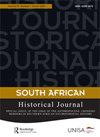Prelude to Unilateralism: Foreclosed Independence Bids in Pre-Federation Southern Rhodesia, 1948 and 1950
IF 1
3区 历史学
Q1 HISTORY
引用次数: 1
Abstract
ABSTRACT This article recovers two resolutions, in 1948 and 1950, respectively, by the all-white parliament in Southern Rhodesia (colonial Zimbabwe) that expressed support for the colony’s independence within the British Commonwealth. The examination of these post-war pushes for sovereignty illuminate how Rhodesia’s political leadership was sensitive to wider changes in the imperial status quo, well before the broader white electorate became similarly seized by colonial withdrawal. The motions highlight the gulf between the metropole and local settler leadership, even when the latter were ostensibly firmly backed by imperial policy and domestic black political opposition was comparatively muted. Additionally, the two parliamentary debates elucidate domestic interparty differences. The article is primarily informed by verbatim transcripts of the pertinent legislative proceedings. The deliberations have largely disappeared from the colony’s historiography – a significant omission given the considerable scholarly interest surrounding Southern Rhodesia’s unilateral declaration of independence from Britain in 1965. This article shows that nearly two decades before that fateful step, changing international factors motivated Rhodesia’s political class to consider major steps that would ensure the maintenance of white dominance.单边主义的前奏:1948年和1950年联邦前南罗得西亚丧失赎回权的独立投标
本文回顾了1948年和1950年,南罗得西亚(殖民地津巴布韦)白人议会通过的两项决议,表示支持该殖民地在英联邦内独立。对战后争取主权的努力的考察表明,早在更广泛的白人选民同样被殖民撤退所困扰之前,罗得西亚的政治领导层就对帝国现状的更广泛变化非常敏感。这些动议凸显了大都市和当地定居者领导层之间的鸿沟,尽管后者表面上得到帝国政策的坚定支持,而国内黑人政治反对派相对较弱。此外,两次议会辩论阐明了国内的党派分歧。该条主要以有关立法程序的逐字记录为依据。考虑到1965年南罗得西亚单方面宣布脱离英国独立引起了学术界的极大兴趣,这些讨论基本上从该殖民地的史学中消失了。本文表明,在这一决定命运的步骤发生近20年前,不断变化的国际因素促使罗得西亚的政治阶层考虑采取确保维持白人统治的重大步骤。
本文章由计算机程序翻译,如有差异,请以英文原文为准。
求助全文
约1分钟内获得全文
求助全文
来源期刊

South African Historical Journal
Multiple-
CiteScore
0.70
自引率
0.00%
发文量
37
期刊介绍:
Over the past 40 years, the South African Historical Journal has become renowned and internationally regarded as a premier history journal published in South Africa, promoting significant historical scholarship on the country as well as the southern African region. The journal, which is linked to the Southern African Historical Society, has provided a high-quality medium for original thinking about South African history and has thus shaped - and continues to contribute towards defining - the historiography of the region.
 求助内容:
求助内容: 应助结果提醒方式:
应助结果提醒方式:


